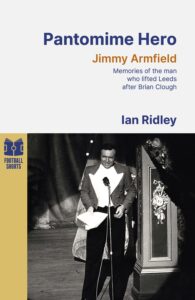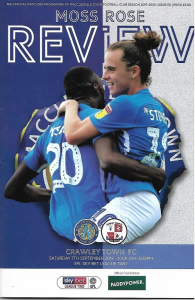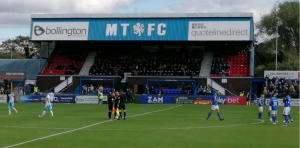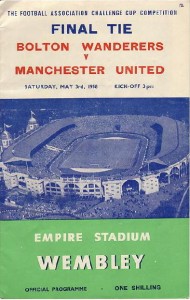Book Review – Pantomime Hero: Memories of the Man Who Lifted Leeds United After Brian Clough (Football Shorts) by Ian Ridley
 Ian Ridley is an award-winning journalist and author. His latest venture is Football Shorts which are a series of books in a collaboration between his own publishing company Floodlit Dreams and renowned sports book publisher, Pitch Publishing. Ridley details in the Notes and Acknowledgments that the inspiration of the series came about during lockdown and his desire for a short sporting read. The intention is that there are to be three books a year, with Pantomime Hero: Memories of the Man Who Lifted Leeds United After Brian Clough by Ridley, the first, with the others coming from former Women in Football CEO Jane Purdon and comedian and writer Andy Hamilton during 2023.
Ian Ridley is an award-winning journalist and author. His latest venture is Football Shorts which are a series of books in a collaboration between his own publishing company Floodlit Dreams and renowned sports book publisher, Pitch Publishing. Ridley details in the Notes and Acknowledgments that the inspiration of the series came about during lockdown and his desire for a short sporting read. The intention is that there are to be three books a year, with Pantomime Hero: Memories of the Man Who Lifted Leeds United After Brian Clough by Ridley, the first, with the others coming from former Women in Football CEO Jane Purdon and comedian and writer Andy Hamilton during 2023.
This first short is dedicated to Jimmy Armfield and provides, “memories of, and a friendship with one of the most humble and remarkable men to ever grace English football”. Whilst this is a very personal account, and not a biographical look at Armfield’s career, readers come to learn that his entire playing career was spent at Blackpool and he won over 40 caps for England, played in the 1962 World Cup in Chile and was part of the 1966 World Cup winning squad. After retiring from playing in 1971 he became manager at Bolton Wanderers leading them to the Third Division title in 1972/73. Then after the calamitous 44 day reign of Brian Clough at Leeds United, Armfield took the Elland Road job in October 1974.
He was able to galvanise a troubled club and squad after the turmoil of the ill-fated Clough spell and took the team to the European Cup Final in 1974/75 where they controversially lost 2-0 to Bayern Munich in Paris. It was a injustice that rankled with the normally calm and unflappable Armfield. Part of the process during that season and described within the book is how Armfield “came up with a novel and unique idea to restore the morale of a club tearing itself apart” – one which makes sense of the title of this book. Despite taking Leeds to the FA Cup semi-finals in 1976/77 and the same stage in the League Cup in 1977/78, Armfield was sacked in July 1978 and he never managed again, instead turning his hand to a successful media and journalistic career, in the same assured way that he had been one of the best right backs in the World.
These wonderful 160 pages are a real tribute to Armfield, and Ridley has produced a book that has a genuine warmth borne out of their friendship and Ridley’s admiration for Armfield’s talent as player, manager and broadcaster. It is also a very personal story, one that can only sometimes come from a shared experience – in this case, their respective battles with cancer diagnosis and sadly also for Ridley, the loss of his wife Vikki Orvice to breast cancer.
If the shorts from Jane Purdon and Andy Hamilton are as good as this, readers are in for a real treat, in what will become a much anticipated series of books.
(Publisher: Football Shorts. January 2023. Paperback: 160 pages)
Buy the book here: Pantomime Hero



